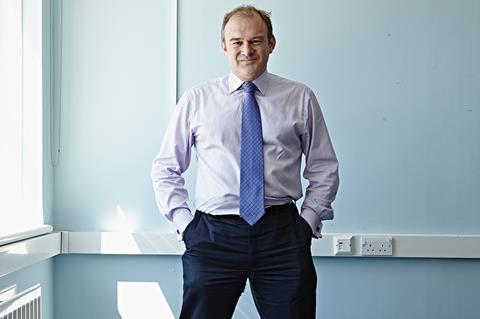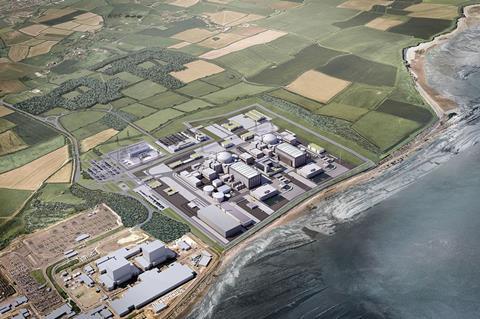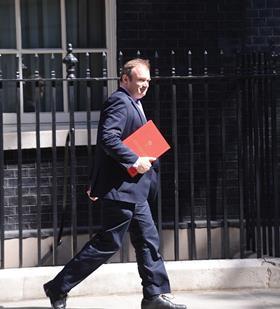The energy secretary on the Green Deal, nuclear, and George OsborneŌĆÖs climate change scepticism

Being a Liberal Democrat secretary of state for climate change in a Tory-led coalition government cannot be the easiest brief. In post for a little under 18 months Ed Davey has already had to to face a number of challenges. In May, he watered down commitments on the amount of electricity to be generated from renewable sources (under pressure from the Treasury). He had already had climate change sceptic John Hayes appointed to his department by prime minister David Cameron. He even suffered the indignity of having his choice for the departmentŌĆÖs permanent secretary - sustainability champion David Kennedy - blocked, again by Cameron.
Does he concede that things have not worked out quite as his party might have hoped? Not a bit of it. ŌĆ£This government is and will be the greenest ever,ŌĆØ he says, echoing the prime ministerŌĆÖs infamous Rose Garden pledge - and goes on to list a series of environmental achievements, from the Green Investment Bank, the launch of the Green Deal, and the ongoing investment in railways.
But since 2010, those in the construction industry hoping for government leadership on sustainability have seen a series of policy U-turns and delays - on feed-in tariffs, Display Energy Certificates (DEC) and zero-carbon housing - and increasingly ambivalent rhetoric from some parts of the government over the importance of tackling climate change. Capping it all has been the delayed and uncertain introduction of the governmentŌĆÖs flagship domestic retrofit programme, the Green Deal, during which time the installation of cavity wall insulation has plummeted by 97%.
A recent YouGov poll found that just 2% of the public believe the government has met its pledge to be the greenest ever. So will Davey be able to tackle his coalition critics, repair the problematic Green Deal, and convince industry sceptics that the government is serious about promoting green growth?
Going green
I meet Davey in Sutton, south-west London, as he is about to join construction apprentices for an afternoon at Carshalton College. Students are learning the skills necessary for servicing a low-carbon construction industry, such as solar panel installation and energy efficiency retro-fitting - key skills for the future UK construction industry, if he has his way. The 47-year-old Nottingham-born and Oxford-educated politician is both polite and polished, and disarmingly free of the ranks of The Thick of It-style advisers and media managers so often in tow when cabinet ministers descend to Earth. So when he hesitates over whether or not to wear a tie for the photos, there is no Malcolm Tucker on hand to manage his image strategy. Still, the quick-fire, well-honed responses to the interview questions leave me with the uncomfortable feeling that, at 1.30pm, IŌĆÖm the one thing standing between the secretary of state and lunch.
Davey is also in Carshalton to promote a Liberal Democrat campaign to create one million jobs, a strategy in which apprenticeships form just one part. The campaignŌĆÖs main focus, he says, is ensuring that the UK takes advantage of the opportunities created by the countryŌĆÖs energy needs. First thereŌĆÖs the need to replace its ageing energy generation capacity with low-carbon alternatives, and then thereŌĆÖs the small matter of retrofitting the existing built environment for a low carbon future. ŌĆ£ThereŌĆÖs a massive opportunity that we have to take - we have to take it because 20% of our power stations are closing in the next 10 years, so weŌĆÖve got to invest because weŌĆÖve got to keep the lights on.
ŌĆ£If we go down the green route, as IŌĆÖm pushing as a Liberal Democrat minister in government, weŌĆÖll have more secure energy, [and] we wonŌĆÖt be so exposed to high and volatile fossil fuel prices. These are very strong economic arguments, very strong value for money arguments, very strong affordability arguments, for going green.ŌĆØ
Like all politicians, Davey is quick to get into a flow of rhetoric, and evidently enjoys relaxing into lists of UK opportunities and coalition achievements. Certainly, he appears relaxed for a man whose flagship retrofit policy, the Green Deal, which launched three months late in January this year, is perceived to be in real trouble. The latest figures show just 36 Green Deal agreements have been signed, next to a public target of reaching 10,000 by the end of the year, and no work has been completed despite a target of creating 65,000 jobs. This is despite the fact that government and local authority programmes have actually funded many assessments. Furthermore, questions have been raised in the last month over the schemeŌĆÖs basic premise - that users will be able to pay back the full cost of retrofit work through lower electricity bills.
WeŌĆÖre creating the worldŌĆÖs first-ever low carbon electricity market
But Davey is bullish, pointing out that the public response to the programme has actually been unexpectedly strong, with over 44,000 assessments undertaken, ŌĆ£probably more than most people expectedŌĆØ, a figure he says demonstrates demand. With four-fifths of those who have carried out assessments telling the Department of Energy & Climate Change researchers that they either have or will undertake some form of retrofit work, he says it is merely a matter of time before this translates into actual work on the ground. ŌĆ£IŌĆÖve had my assessment,ŌĆØ he says, to exemplify the problem, ŌĆ£but I havenŌĆÖt acted on it yet, because IŌĆÖve been a bit busy. But IŌĆÖm going to act on it.ŌĆØ
So is he confident of meeting the 10,000-home target? ŌĆ£I think so, yes,ŌĆØ he says - but implies it might not be met directly through the Green Deal finance package itself. ŌĆ£Seventy-eight per cent [of people who undertook assessments] have either had work done, are in the process of getting the work done, or intend to get the work done. [But] that doesnŌĆÖt mean theyŌĆÖre all going to go down the Green Deal finance route.
ŌĆ£The Green Deal is not just about finance; itŌĆÖs about assessment, itŌĆÖs about having a framework that people and industry can trust in to help people understand what the opportunities are in their homes to save money. A lot of people are either financing it themselves or using ECO [the Energy Company Obligation]. Now is that a success or failure? ItŌĆÖs a success.ŌĆØ
Teething problems
In the meantime he puts the plummeting insulation installation figures down to an expected ŌĆ£difficult transition periodŌĆØ.
But his optimism is not completely unqualified. He admits to ŌĆ£teething problemsŌĆØ, particularly around IT and the finance agreements, the first of which were delayed until May. ŌĆ£ThereŌĆÖs not been very many plans written, letŌĆÖs be honest,ŌĆØ he says. ŌĆ£But letŌĆÖs understand why that is. ThereŌĆÖs been a delay in getting the Green Deal Finance Company and Green Deal providers to make their legal agreements, and then there were a few IT issues that had to be dealt with.
ŌĆ£So yes, there have been some teething problems, and IŌĆÖve been as candid and frank as I can be. But people shouldnŌĆÖt lose heart because itŌĆÖs happening, the assessments are going out the door, ECOŌĆÖs going out the door, the supply chains are building up.ŌĆØ
In that vein he doesnŌĆÖt rule out introducing further measures to stimulate demand in the future, as called for by ║┌Č┤╔ńŪ°ŌĆÖs Green for Growth campaign, but says the number of assessments being undertaken means this is not his current priority. Instead, he insists, some of the problems are actually the industryŌĆÖs to sort out. He issues a challenge to the construction sector to expand its capacity to install solid wall insulation - one of the key target areas of the Green Deal. Providers who geared up to deliver Green Deal work for its original launch date, may look sceptically upon that call. ŌĆ£The demand for Green Deal, which people thought would be a problem, isnŌĆÖt proving a problem. But the supply for some things that people are wanting is not there.
ŌĆ£If you look at the figures [ŌĆ”] weŌĆÖre not seeing enough people who are out there offering solid wall insulation. I know there are some, but in terms of the build-up we want to see, we do get [ŌĆ”] quite a lot people who cannot access green deal installers providing solid wall [insulation].
ŌĆ£WeŌĆÖre monitoring the Green Deal extremely closely, day by day. We have to exercise the judgment of Solomon becauseŌĆ” the judgment is how much do you push demand if supply isnŌĆÖt there.ŌĆØ
Certainly construction is an industry of which Davey can claim to have some knowledge. MP for Kingston and Surbiton since 1997, he spent three years shadowing John PrescottŌĆÖs department from 2002. He was promoted from a junior ministerial post at the business department to become energy and climate change secretary after predecessor Chris Huhne was charged with perverting the course of justice in February last year. In June he hit out at ŌĆ£blinkeredŌĆØ climate change sceptics in the Tory press who he said were ŌĆ£giving an uncritical campaigning platform to individuals and lobby groupsŌĆØ, in a speech widely interpreted as a dig at his Tory coalition partners for a lack of enthusiasm on green issues.
So does he have the support of the whole government for backing green growth? ŌĆ£IŌĆÖm not going to pretend that every green issue that comes up weŌĆÖve agreed on. But the outcome of this [debate] has been a very green outcome,ŌĆØ he says. ŌĆ£The chancellor, the prime minister, the deputy prime minister all realise that energy is the huge opportunity, and the whole governmentŌĆÖs come behind my policies.ŌĆØ
The Green Deal is not just about finance; itŌĆÖs about assessment, itŌĆÖs about having a framework that people and industry can trust in to help people understand what the opportunities are
But is he not disturbed by chancellor George OsborneŌĆÖs open lack of enthusiasm, telling the Conservative Party conference that ŌĆ£a decade of environmental laws and regulations and regulations are piling costs ŌĆ” on households and companies,ŌĆØ and that there was no point ŌĆ£saving the planetŌĆØ if it put the UK out of business? Davey responds: ŌĆ£IŌĆÖve no problem with the Treasury asking tough questions, thatŌĆÖs their job. And I also have no problem when the chancellor said we donŌĆÖt want to price British carbon intensive companies abroad - thatŌĆÖs called carbon leakage.ŌĆØ
But he canŌĆÖt resist emphasising the Lib DemsŌĆÖ role in keeping the government honest on sustainability. ŌĆ£We are massively increasing our incentives for renewables. WeŌĆÖre creating the worldŌĆÖs first-ever low carbon electricity market.
I could go on. These are things Labour never did. The Conservatives before them never did. TheyŌĆÖre happening because the greenest party in British politics, the Liberal Democrats, is part of a government.ŌĆØ
When I remind Davey that the governmentŌĆÖs own Low Carbon Routemap for the built environment, launched at EcoBuild earlier this year, concluded that the policy and regulatory environment was not yet in place to meet the governmentŌĆÖs legally binding carbon targets, he simply counters that ŌĆ£we are on course to meet our targets,ŌĆØ rejecting the idea that further measures are required. ŌĆ£WeŌĆÖve got the right policies, thereŌĆÖs no doubt about that. DonŌĆÖt tell me weŌĆÖre not doing great stuff.ŌĆØ
The reality of coalition politics means Davey has to defend the governmentŌĆÖs record even where the Lib Dems havenŌĆÖt secured the measures they would ideally like. The real record is one of compromise - there are many successful green measures, and the Green Deal still has the potential to become, in DaveyŌĆÖs words, ŌĆ£over the next two decades the most significant energy-efficiency measure everŌĆØ. But this progress is being tempered by an instinctively de-regulatory Treasury and political pressure from Tory grassroots over wind farms and rising energy bills. Davey may have to go further to convince an industry keen to see a trajectory of green growth that the coalition means business.
DAVEYŌĆÖS DILEMMA: NUCLEAR NEW BUILD

One of DaveyŌĆÖs toughest challenges is in reaching a deal with EDF to enable construction of the first nuclear power station, Hinkley Point C, to be built in the UK for 30 years. Costing between ┬Ż10bn and ┬Ż14bn to build - with a consortium of Laing OŌĆÖRourke and Bouygues already selected for the main civils contract - EDFŌĆÖs final investment decision has been delayed until the end of this year while it haggles with the government over the deal that will guarantee the price for the power generated - the so-called ŌĆ£strike price.ŌĆØ
Sources say an attempt to belatedly pull together a deal in time for this yearŌĆÖs March Budget simply served to highlight how far apart the two sides were. But if youŌĆÖre hoping that Davey, who hails from a political party which still officially opposes nuclear power, would be able to reassure the industry that the vital negotiations are on track, youŌĆÖd be wrong. Asked if he could say when a deal would be signed he says: ŌĆ£I canŌĆÖt give you a timetable for that particular negotiation. I wish I could,ŌĆØ adding that ŌĆ£intense and constructive negotiations with EDFŌĆØ were ongoing, with some ŌĆ£rather criticalŌĆØ issues remaining around the strike price.
He says he is willing to see the project fail rather than strike a deal at too high a price. ŌĆ£IŌĆÖve made my position clear within government and to EDF,ŌĆØ he says. ŌĆ£I want value for money for the consumer, I want an affordable price, I want something that is fair for British business. IŌĆÖm not prepared to sign a deal in order to sign a deal.
ŌĆ£Nuclear is a mature industry - itŌĆÖs been around 50 years or more. ItŌĆÖs got to compete with other low-carbon technologies, and if it canŌĆÖt we wonŌĆÖt sign a deal.ŌĆØ
This may be a bargaining position, designed to prompt a deal sooner rather than later. But he also highlights the plans being made by alternative providers; plans which are at least four years away from a start on site. This does not bode well for a quick resolution to the Hinkley situation. ŌĆ£Some people think itŌĆÖs all to do with EDF and Hinkley Point C, itŌĆÖs not,ŌĆØ he says, pointedly. ŌĆ£WeŌĆÖre talking to Hitachi, who bought the Horizon project, and those negotiations are going really well, theyŌĆÖre into their Generic Design Assessment with the Office of Nuclear Regulation, and Hitachi have got a very strong track record of building on time and on budget. And letŌĆÖs see what happens with the third consortium GDF Suez and Iberdrola, IŌĆÖm quietly confident weŌĆÖll see movement there.
ŌĆ£So weŌĆÖve got different options with the nuclear programme, IŌĆÖm optimistic that we can get it happening but it has to be at an affordable price.ŌĆØ
ED DAVEY ON ŌĆ”

DECs
ŌĆ£IŌĆÖve got a lot of sympathy with the case for DECs, but we need to work with our colleagues in CLG [Communities and Local Government] to get agreement about how itŌĆÖs done and when
itŌĆÖs done.ŌĆØ
FITs
ŌĆ£The reform of feed-in tariffs will mean there is going to be more solar panels, for less money, than there would have been. There has to be a fixed budget for these things, thereŌĆÖs no blank cheques for any industry - green or otherwise. ŌĆ£
New energy economy
ŌĆ£Look at the astonishing increase in renewable electricity weŌĆÖve seen. Look at the go-early contracts for difference with electricity market reform. We had 57 applications, much more than we anticipated. If they all came to fruition thatŌĆÖd be 18GW of electricity. DonŌĆÖt tell me thereŌĆÖs no interest in what weŌĆÖre doing.
In my first week as energy secretary, I opened the worldŌĆÖs largest windfarm. A few weeks ago the prime minister and I opened the new worldŌĆÖs largest windfarm [and] a week ago I gave planning consent for what will be the next worldŌĆÖs largest windfarm. So am I bullish? You bet I am.ŌĆØ



























1 Readers' comment